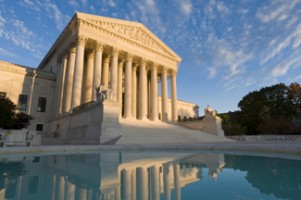Supreme Court's 'future as a functioning institution' is thrown into doubt, NYT editorial says

The U.S. Supreme Court is at a crossroads, according to a New York Times editorial.
The death of Justice Antonin Scalia in February and Republicans’ refusal to consider the Supreme Court nomination of Merrick Garland “have converged to throw the court’s future as a functioning institution into doubt,” the editorial says.
Now some Republicans are threatening to continue to block Supreme Court nominees if Hillary Clinton wins the presidency. “The indefinite blockade not only hobbles the justices’ ability to resolve current cases, it takes open aim at the court’s legitimacy as the sole unelected branch of government,” the editorial says. “Because the court ‘has no influence over either the sword or the purse,’ as Alexander Hamilton wrote in the Federalist Papers, its legitimacy and authority depend entirely on the shared public acceptance of its verdicts.”
Until this year, the editorial says, no one disputed that the president should have wide latitude in choosing justices. Many Republicans opposed Supreme Court nominees Sonia Sotomayor and Elena Kagan, but they allowed the nominations to go forward. And Democrats allowed votes on Supreme Court nominees Robert Bork and Clarence Thomas, despite opposition to their nominations.
If Donald Trump wins the election, there would be calls among Democrats to block his nominees, the editorial says. “But the Constitution asks more of all of us than that,” the editorial says. “In the next Congress, regardless of who wins on Tuesday, the very survival of the court as an independent body will be at stake.”
Write a letter to the editor, share a story tip or update, or report an error.


